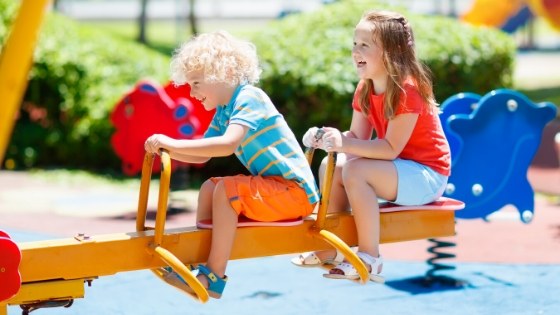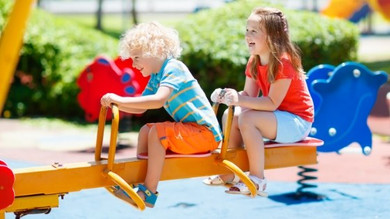
Children love free play, which is why the playground brings complete enjoyment for most kids. During the school year, the playground is an essential part of the day, especially for younger children. It’s more than just a way for kids to release their energy; it’s also fantastic for developing vital social skills. Learn more about how playgrounds help develop social skills.
Since their inception, playgrounds have brought joy to entire communities. After World War II, adventure playgrounds came to fruition, and that idea shifted into what we know and love today. There’s more to playgrounds than their ability to create adventure, but that’s definitely one of the main aspects that impacts kids’ social skills and abilities. That free play ideal gets kids to open up and connect with other students. Teamwork and connection are just a few of the main skills that kids develop on the playground. Below we discuss the important skills they’ll develop!
Teamwork
Like we mentioned above, teamwork is one of the main skills children learn on the playground. Whether at recess or at the park after school, when kids are all together, you’ll notice their team-building skills grow exponentially. When kids are indoor, playing video games, or watching TV, they don’t really have any human connection. Playgrounds are like team sports in a sense—the more they play, the more their teamwork improves.
Empathy
Another important social skill that children learn on the playground is empathy. More and more often, you hear stories about how children at recess took the child without many friends under their wing and developed friendships and relationships. This is empathy at its finest. Kids learn that they don’t want to play alone, so why would anyone else? Children pick up on cues that they wouldn’t if they weren’t surrounded by others their age.
Sharing
Like toys and blocks, playgrounds help teach children the importance of sharing. They teach kids about patience and taking turns. Granted, this skill may take a while to fully develop. You’ll hear stories of kids not waiting their turn for the swings or cutting in line for four square, but you’ll also hear stories of children giving up their spot on the swings so someone else can have a turn.
Leadership
When it comes to games on the playground, you’ll notice that as kids create connection, there will be a few children who stand out as leaders. It’s important to foster these abilities in a healthy way so that they are a leader of connection rather than a leader of manipulation. If you notice one child who’s leaving other kids out, let them know how that hurts feelings, and then give a chance for someone else to be the game’s captain. When you take the time to foster the leadership skills that are developing, you’ll notice more children trying to lead as well.
Positivity
A vital social skill that students will learn on the playground is the power of positivity. Kids will get upset while they play—that’s normal. What’s important is urging those positive moments where children build each other up and cheer each other on. That team play fosters encouragement, which works wonderfully for creating positivity. Don’t underestimate the power that positivity has on developing all sorts of social skills.
If your playground needs an update so that the children can reap all of the rewards of free play, turn to Discount Playground Supply. From outdoor soccer nets to improve teamwork, to swings sets to encourage sharing, we have what you need so that your children develop strong social skills. Check us out!

